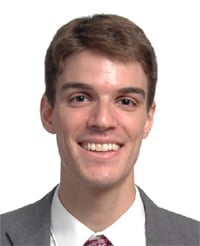Medicine from the heart . . . More from Vincent Minichiello
December 6, 2012
On Thursdays, the Daily Voice showcases selected Thursday Morning Memos, reflective essays about clinical experiences written by faculty, alumni, residents and students of the Department of Family Medicine & Community Health and, occasionally, contributors from other departments. Thursday Morning Memos is UMass Medical School’s homegrown version of narrative medicine, in which the authors process their experiences through writing.
Vinny Minichiello, SOM ’13, and family medicine residency candidate, has clearly had some revelations during his short medical career, lessons that can take others a lifetime in medicine to realize. These include the importance of integrative medicine, medical humility and the importance of questioning current medical practice constantly. I guess that is why we call it lifelong learning.—Hugh Silk, MD
Ego or confidence? Reflections from a tentative heart
 A retired schoolteacher in her 70s presented to the neurosurgery outpatient clinic to go over her lumbar spine MRI results. After looking at the computer screen for a matter a seconds, one of the leading spinal surgeons in the country turned to me and declared the diagnosis: “Spinal stenosis. There is nothing I can do for her. She is elderly, has a weak heart and a smoking history. The risks are too great.” We went into the room together and relayed the news that there would be no surgery to help her back pain.
A retired schoolteacher in her 70s presented to the neurosurgery outpatient clinic to go over her lumbar spine MRI results. After looking at the computer screen for a matter a seconds, one of the leading spinal surgeons in the country turned to me and declared the diagnosis: “Spinal stenosis. There is nothing I can do for her. She is elderly, has a weak heart and a smoking history. The risks are too great.” We went into the room together and relayed the news that there would be no surgery to help her back pain.
“Any other questions?” asked the surgeon.
“No, I guess not,” replied the clearly distressed patient.
As soon as we exited the room, I asked, “What about acupuncture?” He looked at me and smirked, “I’m a DOCTOR. Why would I recommend that?”
“Well . . . there’s a large amount of evidence pointing to acupuncture’s benefit in lower back pain,” I tentatively responded, wondering whether or not I should have just kept my mouth shut.
“Those alternative medicine people are all a bunch of charlatans, trying to get your money,” he replied, ignoring my previous statement. I stopped pressing any further, realizing the next comment out of his mouth would probably be, “I know best.”
During an integrative medicine elective rotation at the University of Arizona in Tucson, we had one class session with a neurosurgeon who also practices equine therapy. He welcomed us to his farm, where he trained horses—not to be ridden, but to help people understand themselves better. “I need a volunteer,” he said, as the group walked up to the pen. I raised my hand, and he let me in the gate. I had never ridden a horse before and had maybe just touched a horse once as a child. So to be standing in an enclosure with just me, the doctor and the horse, and all my classmates watching, I felt a little nervous to say the least. The exercise was simple: guide the horse by the reins, walk in a circle, and then come to a stop. The neurosurgeon demonstrated and the horse obeyed quite nicely. While I was able to walk with the horse, when I stopped on the first three attempts, the horse kept walking past me, ignoring the fact that I was no longer walking. “Now,” said the doctor, “stop with a sense of confidence and gentle firmness.” I took a breath and tried one more time . . . and the horse stopped. “Now knowing how sensitive horses are to a person’s state of mind, imagine how sensitive another human must be.”
Medicine has a culture unto itself. A way of speaking. A way of thinking. A way of making decisions. And as with any culture, those who come from outside of that environment may experience a “culture shock.” As a medical student in his final year looking back, I am only now becoming comfortably assimilated enough so that I can take a step away from this adopted culture and see where and how I wish to stand in my future practice. For me the line between timidity and egotism is a part of this culture with which I struggle, almost daily. How do I walk the tightrope of confidence without falling too far in one direction or the other?
I do not suppose to have the answer to this question, but perhaps we might consider how we “acquire . . . the grace of humility,” as Sir William Osler once described. With more and more experience in this medical profession, it is only natural that we acquire the tools needed to bring health and healing to our patients. And I am so honored to have begun my journey toward mastery of medical knowledge and wisdom. But perhaps the tightrope will not seem so narrow if we practice medicine with a blend of confidence and humility.